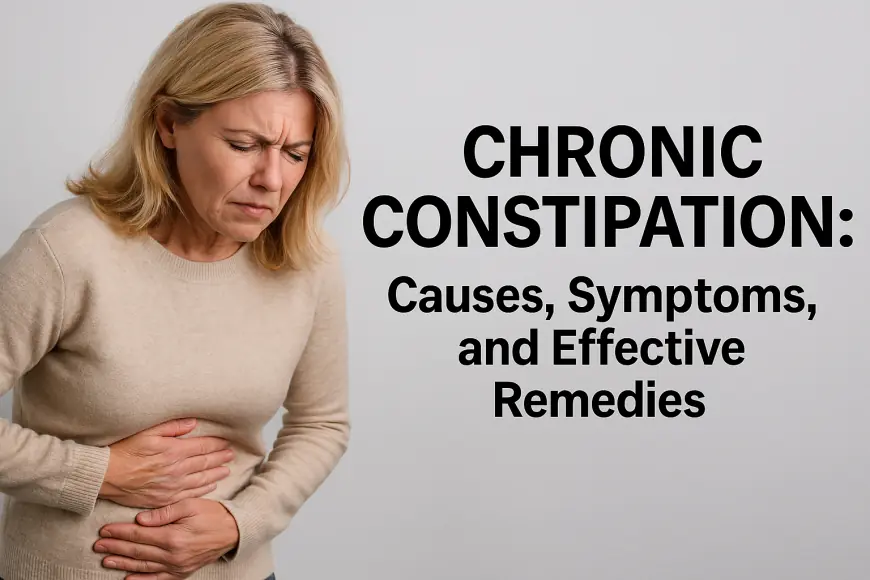Chronic Constipation: Causes, Symptoms, and Effective Remedies
A diet low in fiber-rich foods like fruits, vegetables, and whole grains can contribute to chronic constipation.

Understanding Chronic Constipation
Chronic constipation is a commonplace digestive trouble that impacts many people. It occurs whilst bowel movements come to be rare or hard for an extended period. While occasional constipation is ordinary, continual constipation can result in soreness and different fitness issues. Identifying the reasons and symptoms can assist in finding an powerful chronic constipation remedy.
Causes of Chronic Constipation
Chronic constipation can develop due to various reasons. Lifestyle habits, diet, and medical conditions all play a role in digestive health. Some of the common causes include:
1.Lack of Fiber in Diet
Fiber helps in adding bulk to stools, making them easier to pass. A diet low in fiber-rich foods like fruits, vegetables, and whole grains can contribute to chronic constipation.
2.Insufficient Water Intake
Dehydration can make stools hard and difficult to pass. Drinking enough water supports digestion and helps prevent chronic constipation.
3.Inactivity and Sedentary Lifestyle
Physical movement stimulates bowel activity. Lack of exercise or prolonged sitting can slow down the digestive system, leading to constipation.
4.Ignoring the Urge to Pass Stools
Delaying bowel movements can cause stools to become hard and dry, making them difficult to pass. Over time, this habit can lead to chronic constipation.
5.Medical Conditions and Medications
Certain health conditions like irritable bowel syndrome (IBS), diabetes, and thyroid disorders can contribute to chronic constipation. Additionally, some medications, including painkillers, antidepressants, and iron supplements, can slow down bowel movements.
Symptoms of Chronic Constipation
Recognizing the symptoms of chronic constipation can help in seeking timely treatment. Common symptoms include:
1.Infrequent Bowel Movements
Having fewer than three bowel movements per week is a common sign of chronic constipation.
2.Hard and Dry Stools
Passing stools that are dry, hard, and lumpy can indicate constipation. These stools are often difficult to pass and may cause discomfort.
3.Straining During Bowel Movements
If passing stools requires excessive effort or straining, it may be a sign of chronic constipation.
4.Feeling of Incomplete Evacuation
Many people with chronic constipation feel as though their bowel movements are not fully complete, leading to discomfort.
5.Bloating and Abdominal Pain
A buildup of waste in the intestines can cause bloating, gas, and abdominal discomfort.
Effective Chronic Constipation Treatment
Managing chronic constipation requires lifestyle changes and, in some cases, medical intervention. Here are some effective remedies:
1.Increase Fiber Intake
Eating more fiber-rich foods can help soften stools and promote regular bowel movements. Foods like fruits, vegetables, whole grains, and legumes should be included in daily meals.
2.Stay Hydrated
Drinking enough water throughout the day is essential for digestion. Water helps soften stools and prevents constipation.
3.Exercise Regularly
Physical activity stimulates bowel function. A daily walk, yoga, or any form of exercise can improve digestion and reduce constipation.
4.Establish a Routine
Setting a regular schedule for bowel movements can train the body to have predictable digestion patterns. It is also important not to ignore the urge to go to the bathroom.
5.Use Natural Laxatives
Foods like prunes, flaxseeds, and aloe vera can help in relieving chronic constipation naturally. However, laxative use should be moderate to avoid dependence.
6.Consult a Doctor for Medical Treatment
If lifestyle changes do not improve chronic constipation, consulting a doctor is necessary. A healthcare provider may recommend medications, stool softeners, or other medical treatments to manage the condition effectively.
Conclusion
Chronic constipation can be uncomfortable, but it is manageable with the right approach. Identifying the causes and symptoms can help in choosing the best chronic constipation treatment. Eating a fiber-rich diet, drinking enough water, exercising, and establishing a healthy routine can significantly improve digestion. If symptoms persist, seeking medical advice is the best course of action.
What's Your Reaction?
 Like
0
Like
0
 Dislike
0
Dislike
0
 Love
0
Love
0
 Funny
0
Funny
0
 Angry
0
Angry
0
 Sad
0
Sad
0
 Wow
0
Wow
0




















































